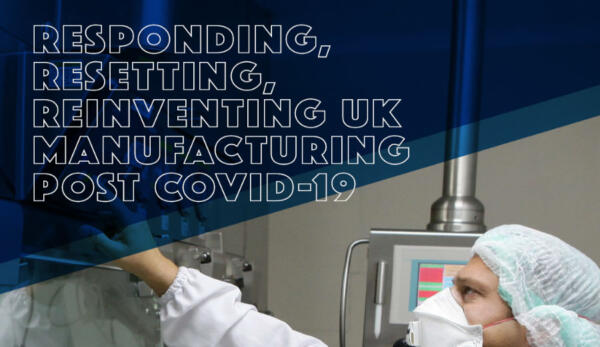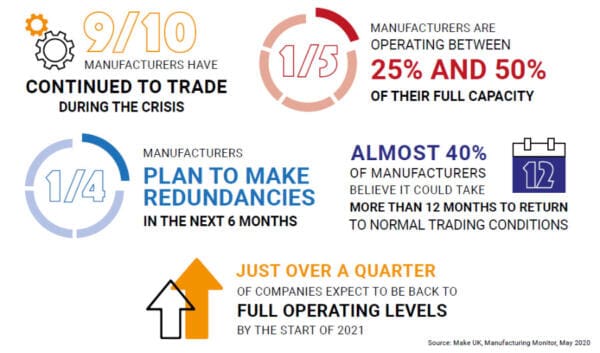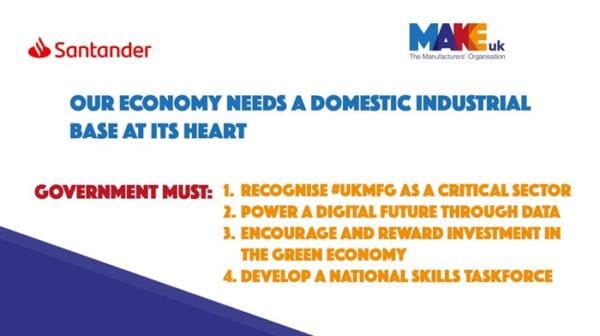
Responding, Resetting and Reinventing UK Manufacturing Post COVID-19
Today MAKE UK, in association with Santander, has released the first detailed analysis of the effect of COVID-19 on UK manufacturers. The report sets out what a new digital, greener and more sustainable economy looks like, with a re-purposed industrial strategy to catapult manufacturing to centre stage in the UK.
The first detailed analysis of the COVID-19 impact on UK manufacturers reveals it will take until 2022 for manufacturing to recover to pre COVID-19 levels, potentially costing £35.7 billion in Gross Added Value this year alone.
However, it also highlights how quickly manufacturers responded at a time of national crisis – from filtration specialists who’ve turned their hand to creating personal protection equipment (PPE) face masks, to signage firms diversifying their products to create social distancing signage for customers across Europe.
The report makes clear the impact of COVID-19 on some of the world’s most established manufacturing nations, including the US and Germany, surmising that industrial production fell by 11.2% (monthly) and 11.6% (annually) respectively. It reiterates the importance of manufacturers diversifying their customer base to help achieve growth, maintain demand and avoid over-reliance any one specific market or customer.
A strong industrial sector is the foundation to build back better. The report makes four recommendations to Government:
Stephen Phipson CBE, Chief Executive at MAKE UK, commented: “History has shown us that a strong industrial base provides the foundations needed to create a prosperous society. However, the UK has, unfortunately, become culturally tone-deaf to the idea that manufacturing matters and can provide solutions to the challenges that we face, something the sector has aptly shown during this crisis.
“A new digital, greener and more sustainable economy will emerge from this with an opportunity to catapult manufacturing, science and engineering once again to centre stage in the UK.”

“While Covid-19 presents the most testing time for manufacturers at both ends of the supply chain, their aptitude to handle shock and change for the better is enduring, and we stand ready to support them.”
The report also looks at the impact of the disruption to supply chains and logistics management. It reveals the extent of dependence on China, with 31% of small companies and almost two-thirds of large companies (65%) sourcing components there or other affected countries.
However, the report reveals a striking desire to mitigate risk and build resilience in the future by reviewing supply chains with more than half of companies (53%) already reviewing them and a further third committed to doing so in the next year. This shift will be vital in helping the Government with its exercise to map out supply chains and understand critical sectors and components which will be needed to build greater resilience into the economy overall.

Looking forward, the report analyses the opportunities for building a new economy with a renewed manufacturing sector at its heart. In particular, this will require industry to embrace the need for digital skills that can support the adoption of technology and the way it is deployed to rethink existing systems and processes, especially with the use of green and sustainable technologies. According to Make UK, this will require the skills to support a digital transformation which must now be a national strategic priority with the creation of a National Skills Task Force.
The report also stressed that by embracing technological change, this will help manufacturers get ready for the new international trading environment they will face both post-COVID but also outside the EU. This will help them take advantage of new markets and trading opportunities, possibly without having any physical presence on the ground.
Recognising UK manufacturing as a critical sector
- Identifying it as a critical sector for the UK economy and aiming for the UK to be in the top five manufacturing nations in the world.
- Work with the sector to put manufacturing at the heart of the regional economic recovery involving partnerships with key local stakeholders.
- Work with the sector to effectively map out a global supply chain resilience programme, agreeing on coordinated action with key economic partner countries to maintain current trade flows and removing administrative restrictions.
- Supporting manufacturers to move goods, products and services with ease through smart supply chains and global logistics.
Powering a digital future through a new energy: data
- Provide additional fiscal incentives to ensure that critical industrial R&D capacity and spend are safeguarded as a means of improving national resilience.
- Roll out the Made Smarter Review approach to SME digital adoption nationally, with simplified funding streams and a lead partner coordinating efforts within Regions.
Encouraging and rewarding investment in the green economy
- Encourage manufacturers to lead the green revolution by making grant schemes simpler, fewer and more accessible for SMEs so that more take the leap to invest in green solutions. Upfront investment costs remain the biggest barrier to implementing energy efficiency measures for manufacturers.
Developing a National Skills Taskforce to meet the skills needs for the future
- Ensure that the surplus of skilled employees that will inevitably be leaving UK manufacturing businesses are matched with demand, including opening up opportunities for those skills to be transferred into other sectors where they are needed.
- Support employees to identify jobs where their skills have relevance and cross over within both the manufacturing and wider sectors.
- Develop a flagship upskilling programme that would see employees develop the digital skills they need for the new economy so the recovery can be future-proofed.
Download the full report, ‘Responding, Resetting and Reinventing UK Manufacturing Post COVID-19’ here.
For more news from the Manufacturers’ Organisation, visit MAKE UK’s News and Events page.

Make UK
0808 168 5874
Website
Email






